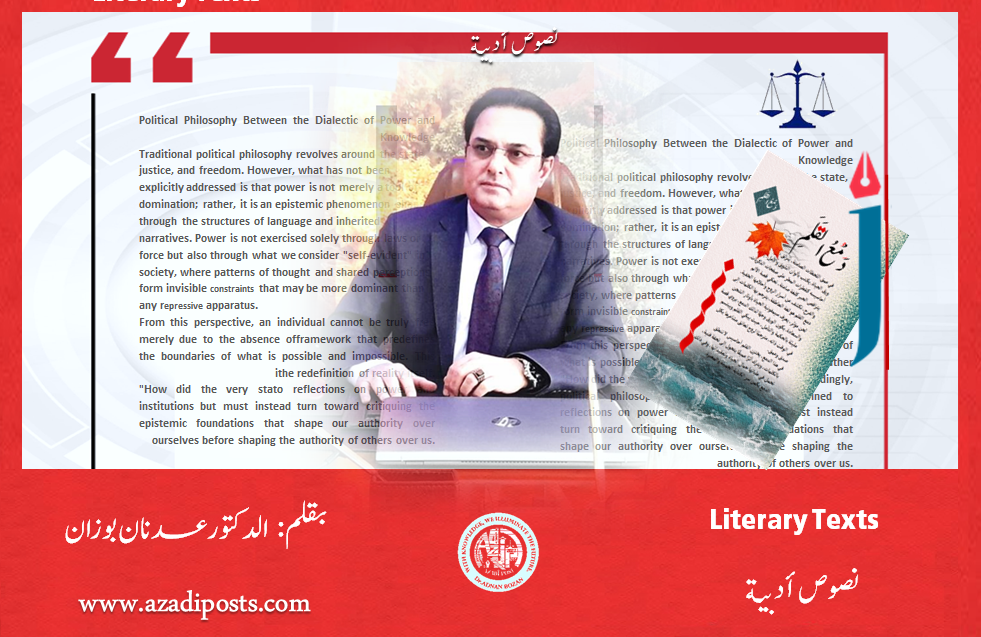
By: Dr. Adnan Bouzan
In exile, not only do homelands break... but language breaks too.
And in the breaking of language, existence is reshaped.
Exile is not a place far beyond the limits of geography, but a rupture in the soul, a fragmentation of identity, a void that stretches within the memory like an endless shadow. Every exile is a banishment from the first paradise, from the warmth of meaning, from a home called "us." While homeland is a place of belonging, exile is a precise engineering of anxiety, a map of disintegration, and an experimental lab for recreating the self, but outside its own womb.
In exile, language itself becomes exile. Words that once ignited warmth among family become cold lava in the mouth of the stranger. You try to say "mother" in the language of the other, but the letters tremble, and the tone of affection is lost. You try to write about "homeland," only to discover that you are not writing about it, but bleeding from it.
Writing in exile is not a creative act, but a ritual of survival. It is resistance to the silence imposed by force, and to the forgetfulness that stealthily creeps in like moisture in the walls of memory.
Exile is inherently political, for you are exiled only when you are a witness to a crime, or a participant in a dream, or a bearer of a voice that the authority wanted to silence. Exile is a political decision before it becomes an existential experience, but it transforms in the soul of the exile into a philosophy; for what does it mean to be outside the place, while you have not yet exited the time to which you belong?
You are there, in the "new place," but your heart still resides on the sidewalks of bombed cities, in the alleys where childhood laughed, in the dialects of people, their faces, and the smell of bread in the morning.
The exiled does not live in the moment, but lives in the gap between two moments. He is always stuck between "what was" and "what will never be." He is neither a son of the now, nor a citizen of the future. He is a temporal refugee, a prisoner of questions that find no homeland for their answers.
And in exile, the relationship with time changes. Days no longer become units of time, but turn into markers resembling the ruins of abandoned cities. Every morning is a possibility for longing, every night a conversation with ghosts. Nothing is more bitter than waking up to the sound of a language that is not yours, and sleeping on the echoes of dreams you cannot understand.
Exile reshapes consciousness, plants doubt in every certainty, and pushes you to question even the most self-evident things.
Why are we exiled?
Who has the right to expel a person from their land?
And does a person become complete without their land?
Or is completeness itself a trick invented by authority to tame heads that refuse to bow?
In politics, exile resembles an admission of failure, but it is also a declaration of resistance. The greatest political movements were born in exile, because freedom is not granted in the heart of despotism, but is created outside its borders.
Exile may be a space of helplessness, but it is also the womb of new ideas. From there, from afar, we write letters to the inside, sketch deferred dreams, weave an alternative language, and create temporary homelands from letters. We break the siege with them, and raise a generation that will not be defeated twice.
The politician in exile must also be a philosopher, not to justify his exile, but to recreate meaning from under the rubble. And the true exile refuses to be a silent witness; he turns his alienation into a platform for speech, for rebellion, for writing, for noble anger.
Yet, at the heart of all this, remains the question:
Can the exile ever return to his homeland?
And more dangerously: Will he recognize his homeland when he returns?
Exile does not leave us as we are. It changes our internal maps. We may return one day, but we carry in our pockets ash instead of keys, images of cities that no longer exist, and longing for places that no longer recognize us.
Return is not always redemption; it may be another form of exile.
For those who have not been exiled do not understand our new language, nor do they know how much we have silently cried, or how much we betrayed the language when we found no one to understand it.
We return, but we do not return.
We come back, but we do not find ourselves.
And in a silent moment of contemplation, I stand before the window of exile.
I watch the world pass through me... I am not it, nor is it me.
But at least, now I know who I am:
I am the exile who no longer searches for a homeland on the map, but in the word.
I am the one who has realized that exile is not an end, but a beginning...
A beginning of new consciousness,
And a homeland whose flag cannot be reached,
Because it is raised in the heart.


